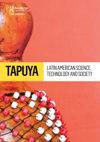巴西和肯尼亚艺术家之间的南南对话:去殖民主义和交叉的女权主义观点
IF 1.2
Q2 HISTORY & PHILOSOPHY OF SCIENCE
Tapuya: Latin American Science, Technology and Society
Pub Date : 2022-11-14
DOI:10.1080/25729861.2022.2126245
引用次数: 2
摘要
在本文中,我们分析了巴西和肯尼亚艺术家(积极分子艺术家)使用动画挑战贬低全球南方知识、历史和故事的殖民等级制度的经验。我们从人种学观察、深度访谈和艺术家在两个动画工作室的经验中汲取灵感:(a)玛丽埃尔的肖像,与内罗毕的肯尼亚艺术家一起制作;(b)向旺阿尔戈·马塔伊致敬,与萨尔瓦多的巴西艺术家合作制作。我们问:艺术家的创作实践如何被用作全球运动建设的工具,以对抗全球南方人民之间支离破碎的关系的殖民遗产?我们唤起非殖民化和交叉女权主义的观点,提出对艺术主义的理解,考虑到全球南方语境的特殊性,将其连接到两个轴:(a)建立对话空间和(b)动员记忆和历史。我们对南南艺术家对话的理解源于源于拉丁美洲和非洲学术的“多元性”、“不完整性”和“谦卑”概念相互交织的方式。当边缘群体交换“定位知识”并通过艺术主义从“交叉立场”或“lugares de fala”表达自己时,这可能具有约束力,在全球南方人民之间建立变革联系。本文章由计算机程序翻译,如有差异,请以英文原文为准。
South-to-South dialogues between Brazilian and Kenyan artivists: decolonial and intersectional feminist perspectives
ABSTRACT In this article, we analyze experiences in which Brazilian and Kenyan artivists (artists who are activists) used animation to challenge colonial hierarchies that devalue Global Southern knowledges, histories, and stories. We draw from ethnographic observations, in-depth interviews, and artivists’ experiences in two animation workshops: (a) Portrait of Marielle, produced with Kenyan artivists in Nairobi; (b) Homage to Wangarĩ Maathai, produced with Brazilian artivists in Salvador. We ask: how can artivist creative practices be used as tools for global movement building, contesting the colonial legacy of fragmented relationships between Global South peoples? We evoke decolonial and standpoint intersectional feminist perspectives to propose an understanding of artivism that considers the specificities of Global South contexts, connecting it to two axes: (a) establishing dialogical spaces and (b) mobilizing memories and histories. Our understanding of South-to-South artivist dialogues results from the ways in which notions of “pluriversality,” “incompleteness” and “humility,” which stem from Latin American and African scholarship are intertwined. When marginalized groups exchange “situated knowledges” and express themselves through artivism from “intersectional standpoints” or “lugares de fala,” this can have a binding nature, creating transformative connections between Global South peoples.
求助全文
通过发布文献求助,成功后即可免费获取论文全文。
去求助
来源期刊

Tapuya: Latin American Science, Technology and Society
Social Sciences-Social Sciences (all)
CiteScore
1.60
自引率
0.00%
发文量
39
审稿时长
19 weeks
 求助内容:
求助内容: 应助结果提醒方式:
应助结果提醒方式:


